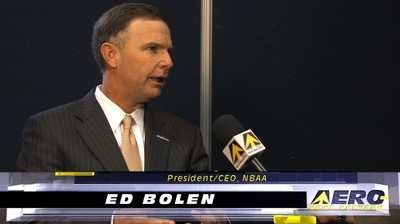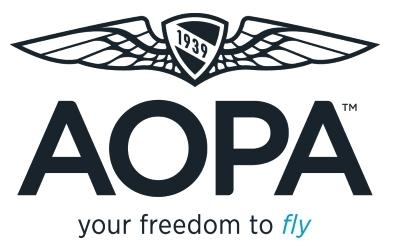Groups Weigh In On The Proposed Legislation Passed By Senate Commerce Committee Wednesday
Several key aviation groups have weighed in on the Senate version of the FAA reauthorization bill passed Wednesday by the Senate Commerce Committee. The bill has been sent to the full Senate for consideration.

“EAA put in tremendous work to make sure recreational aviation has a framework to grow and thrive in this legislation,” said Jack Pelton, EAA CEO/Chairman (pictured). “We wanted to make sure that this was a bipartisan measure that can move forward in Congress and give the FAA what it needs in the way of stable funding while supporting our freedom of flying. Our thanks to Senate Commerce Chairman John Thune (R-SD), Ranking Member Bill Nelson (D-FL), and lawmakers on both sides of the aisle who worked together to make this happen in a collaborative and bipartisan fashion.”
If passed by Congress and signed by the President, this legislation would authorize FAA funding through September 2017, while permanently implementing the other provisions of the bill. The bill is expected to go to the Senate floor for a vote in early April, immediately following the Easter recess.
The next move after Senate passage rests with the House, where an FAA reauthorization bill containing ATC privatization passed out of committee but has been shelved by House leadership. The House can either accept the Senate bill, advance its own bill and go to conference with the Senate version, or attempt to stall in hopes of advancing ATC reform later. While the matter is being considered in Congress, a short-term continuing resolution is necessary to provide the FAA with funding for the next several months.
The House has passed such a measure but it has yet to be approved by the Senate. EAA says it will continue to watch all such legislation closely, as Rep. Bill Shuster (R-PA) continues to publicly maintain his goal to implement ATC privatization, where control of the national airspace system would move to a not-for-profit board dominated by airline interests.
“While today’s news from the Senate is very good and contains many provisions favorable to general aviation on which EAA has worked very hard, we will continue to be vigilant to ensure there are no sudden curves thrown into the straight path established toward FAA reauthorization,” Pelton said. “We will keep EAA members well informed of happenings in the nation’s capital that could affect them and their ability to fly personal aircraft.”

“We thank Chairman Thune, Ranking Member Nelson and other committee members for their bipartisan support for this legislation,” said NBAA president and CEO Ed Bolen (pictured). “They recognize that, for America to retain its leadership position in aviation, the status quo is not acceptable – S.2658 brings smart, targeted solutions to the challenges we face. It moves us forward without putting at risk the citizens and communities all over America who depend on aviation – including general aviation."
Bolen noted that the bill includes language addressing a specific NBAA priority: an amendment, introduced by Sen. Dan Sullivan (R-AK), which ensures the real-time location of general aviation aircraft is not disseminated or displayed, protecting the privacy and security of flight information.
The bill also calls for measures to streamline the certification process for aviation technologies, raise the bar on aviation safety, integrate unmanned aircraft systems, accelerate implementation of a Next Generation (“NextGen”) aviation system and provide a plan for the U.S. Department of Transportation to modernize third-class medical requirements for small-aircraft pilots.
“This bill takes the right approach to FAA reauthorization and aviation system modernization,” Bolen said. “Equally important, it retains a focus on the reality that the nation’s airports and airspace operate in the public interest, and should serve the public, including all aviation stakeholders, as well as all citizens and communities. We will continue working with the Senate as it takes up this legislation for floor debate, and we look forward to its final passage.”

“NATA thanks the members of the Commerce Committee for their swift, bipartisan action on this important legislation," said president and CEO Thomas L. Hendricks (pictured). "The Committee's ability to move forward in such an expeditious manner is a testament to the hard work of Chairman Thune, Ranking Member Nelson and their staffs. We strongly support the legislation's approach to making the FAA and it's programs more effective and hope the full Senate will take up and approve this legislation in April."
While ALPA said the bill contained many positive elements, the pilots' union said it should also have included a measure in the house version requiring secondary barriers to airliner cockpits.
“We are pleased that the Commerce Committee has approved a bipartisan bill that is safety-forward," ALPA said in a statement.
“By maintaining critical safety regulations that are currently in place, notably those related to pilot experience and qualifications, S. 2658 will help extend one of the safest periods in aviation history and solidify our nation’s standing as one of the safest air transport systems in the world.
“This bill acknowledges the need to address the significant risk associated with air transportation of lithium batteries. We will continue to pursue all avenues for the full regulation of lithium batteries as dangerous goods and complete harmonization with international standards but recognize that the inclusion of lithium-battery provisions in S. 2658 is a step forward. We continue to maintain that the United States should be a world leader in aviation safety.
“We are also pleased the bill includes previous Senate-passed compromise language on third class medical reform for general aviation pilots, which improves the overall medical certification process and maintains the safety of our airspace.
“We are disappointed that the Senate FAA bill does not mirror the House version in requiring secondary barriers on new passenger aircraft. Secondary barriers are a simple, low-cost means of preventing a breach on the cockpit and a demonstrated method of improving aviation safety. We hope that improvements will be made to require secondary barriers as the bill moves through the legislative process.

“We’re pleased that the Senate is keeping FAA reauthorization legislation moving," said Jim Coon, AOPA senior vice president of government affairs. "Past experience has shown that limping along from extension to extension—sometimes for years—can really slow important long-term initiatives. This bill would give the FAA a way forward while addressing many of the big issues that matter to the general aviation community, including third class medical reform and aircraft certification reform.”
But the UAV industry may look less favorably on the bill. Forbes contributor John Goglia writes that the bill states:
“(I)t shall be unlawful for any person to introduce or deliver for introduction into interstate commerce any unmanned aircraft manufactured on or after the date that the [FAA] adopts a relevant [manufacturing] standard, unless the manufacturer has received approval …for each make and model.”
Goglia says that the standards set forth in the bill will be difficult for major manufacturers to meet, let alone a small business or hobbyist who wishes to build his or her own UAV. The bill makes no exception for hobbyists.
The bill states that in order to obtain the required approvals, the builder or company would have to meet safety standards that would be produced though a consensus process involving industry, government, and "community-based aviation organizations," which could mean the Academy of Model Aeronautics, Goglia says.
All manufacturers regardless of size would be required to provide "the aircraft's operating instructions" and verify that the aircraft met the specified standards. All manufacturers, which would mean individual builders as well, would have to provide an sample aircraft to the FAA for its approval.
Goglia had his assertions that the rules would apply to a person building a small UAV in a shed or basement would have to meet those standards.
After passage by the Senate, the bill would still have to be reconciled with companion legislation passed in the U.S. House before being presented to the President for his signature.
(Source: Multiple news releases)
 ANN's Daily Aero-Term (04.24.24): Runway Lead-in Light System
ANN's Daily Aero-Term (04.24.24): Runway Lead-in Light System ANN's Daily Aero-Linx (04.24.24)
ANN's Daily Aero-Linx (04.24.24) Aero-FAQ: Dave Juwel's Aviation Marketing Stories -- ITBOA BNITBOB
Aero-FAQ: Dave Juwel's Aviation Marketing Stories -- ITBOA BNITBOB Classic Aero-TV: Best Seat in The House -- 'Inside' The AeroShell Aerobatic Team
Classic Aero-TV: Best Seat in The House -- 'Inside' The AeroShell Aerobatic Team Airborne Affordable Flyers 04.18.24: CarbonCub UL, Fisher, Affordable Flyer Expo
Airborne Affordable Flyers 04.18.24: CarbonCub UL, Fisher, Affordable Flyer Expo






